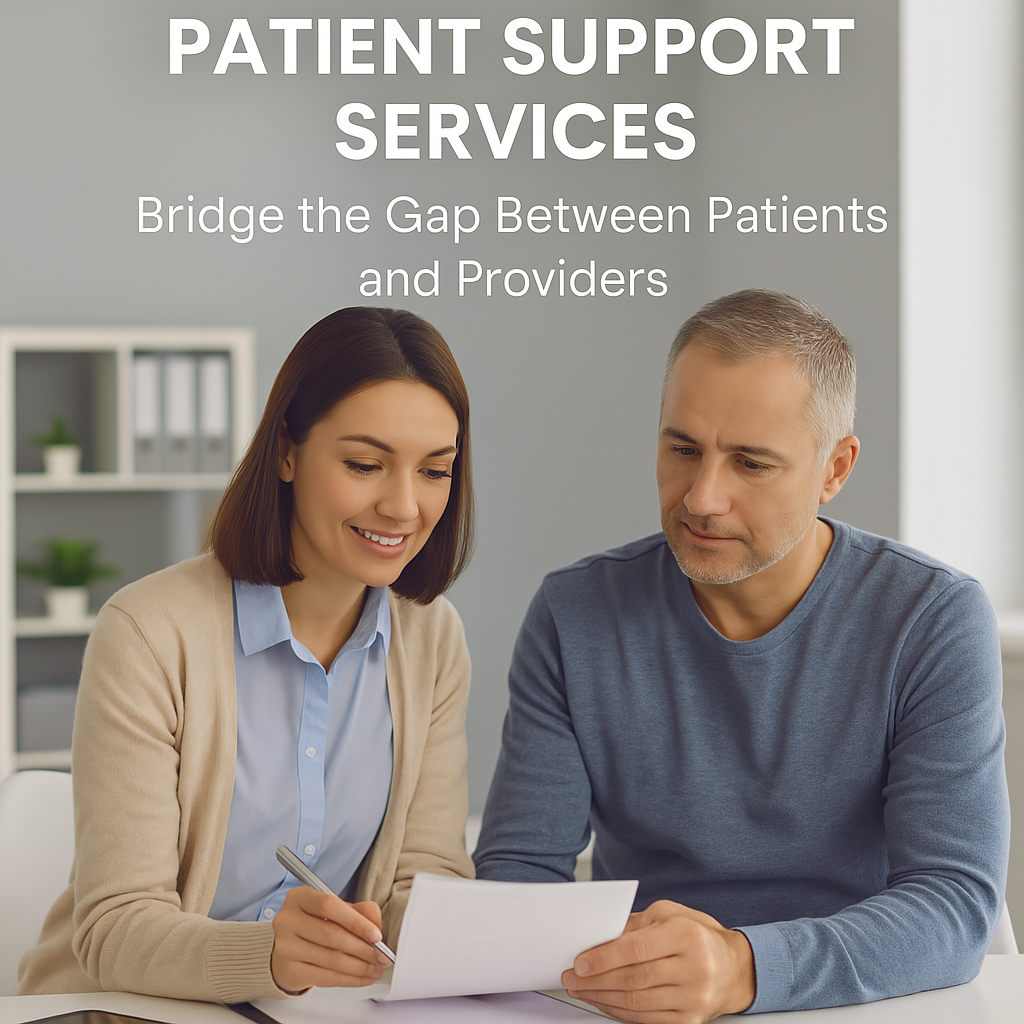%201.svg)
%201.svg)


Healthcare is an intricate system where patients and providers share a common goal—to achieve the best health outcomes. However, navigating this system can often feel daunting, whether it’s understanding a diagnosis, accessing treatment options, or managing medication regimens. This is where Patient Support Services comes in, as a critical bridge to connect patients and providers, close communication gaps, and facilitate better healthcare experiences for all parties involved.
This post will discuss what patient support services are, why they are needed, and the tangible benefits they offer to both patients and providers. We’ll also explore how these services are evolving to meet future challenges and improve healthcare outcomes.
Patient Support Services (PSS) are programs designed to assist patients through every step of their healthcare journey. These services are typically offered by healthcare institutions, pharmaceutical companies, and third-party organizations to provide a comprehensive suite of assistance, including education about conditions, help with medication management, access to financial resources, or navigating insurance complexities.
Beyond logistical help, these services also foster emotional support, empowering patients to make informed decisions about their care while ensuring providers have the tools to deliver better care in a timely manner.
A critical issue in healthcare today is the gap that often exists between patients and providers.
Here’s a closer look at the factors driving this disconnect:
When left unaddressed, these disconnects can lead to poor adherence to treatment plans, decreased patient satisfaction, and ultimately, worse health outcomes.
Patient Support Services are specifically designed to address these challenges by serving as a link between overwhelmed patients and busy providers. Here’s how they bridge the gap:
PSS offers resources such as one-on-one counseling, online educational tools, and videos that translate complex medical jargon into easy-to-understand language. For example, a support service may provide tutorials explaining how certain medications work, reducing confusion and empowering patients to take control of their care.
High treatment costs are often a barrier to care. Patient Support Services streamline access to financial aid resources like grants, insurance coverage navigators, and patient assistance programs, significantly reducing the financial stress for patients while ensuring timely treatment.
From diagnosis to recovery, Patient Support Services often include options such as counseling or peer support groups. This emotional backup helps patients feel less alone while tackling health challenges, improving both mental and physical well-being.
Non-adherence to prescribed medication is a major issue, costing the U.S. healthcare system approximately $100 billion annually. Services like reminder systems, regular follow-ups, and personalized coaching ensure patients stick to their treatment regimens.
These programs don’t just serve patients; they collaborate with providers by giving them insights into patient progress, adherence, and satisfaction, thus offering a more holistic view of patient care.
The patient experience sees dramatic improvements when support services are in place. Here are some specific benefits these services provide to patients:
Providers also benefit significantly from these programs, enabling them to focus on delivering care with fewer administrative burdens.
When patients have external support to follow through on care plans, providers observe better patient compliance, helping improve long-term outcomes.
Patient Support Services free up providers' time by handling patient education, assistance with billing questions, and medication reminders, allowing providers to concentrate on clinical decisions.
Satisfied and empowered patients are more likely to trust their healthcare providers, fostering stronger rapport and improving overall retention rates for healthcare practices.
Many PSS platforms collect valuable patient feedback that helps providers identify pain points and improve the delivery of care.
The landscape of Patient Support Services is evolving rapidly to meet the demands of modern healthcare. Here are promising trends and developments projected to shape these services in the future:
Telehealth platforms and AI-driven apps are becoming increasingly popular. These technologies allow support services to interact with patients in real-time, predict their needs, and provide personalized solutions.
Patient Support Services are beginning to involve not just nurses but also pharmacists, dietitians, and even mental health professionals to ensure a rounded approach to care.
The focus is shifting toward prevention rather than reaction, where support services help identify potential obstacles before they become significant barriers to care.
Many programs are expanding to manage long-term conditions such as diabetes, arthritis, and heart disease, where consistent care and support are essential.
AI tools such as chatbots and virtual assistants will ensure faster response times and more personalized support for patients navigating complex systems.
Patient Support Services are more than a convenience; they are a necessity in modern healthcare. By bridging the gap between patients and providers, they enhance every stage of the patient's healthcare experience—from initial diagnosis to recovery. They provide personalized support that ensures patients feel empowered while allowing providers to deliver exceptional care unfettered by logistical challenges.
Whether it’s improving communication, enhancing patient outcomes, or streamlining processes for busy providers, Patient Support Services play a vital role in healthcare systems around the world. For healthcare professionals and institutions, investing in these services is no longer optional; it’s essential to provide the kind of care that patients truly deserve.
If you’re ready to take the next step in patient care or want to learn how to integrate support services into your practice, start exploring solutions that fit your needs today.


